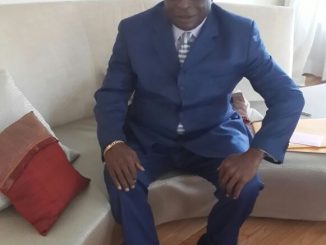By Titus Boye-Thompson :
A five year time line has just passed, marking the same period of authority of Ernest Bai Koroma as President of the Republic of Sierra Leone and the APC as a party returned to power by popular plebiscite. The marking of such an anniversary is symbolic especially taking into account that the Constitution of Sierra Leone dictates that there be elections for the Presidency and members of the Houses of Parliament after every five years after assuming office. The passing of the five year mark was therefore a time for reflection on the mandate given to Ernest Bai Koroma and the APC for the stewardship of this nation state. The cynic will ask the question as to what benefits have accrued to the people of this Country during those five years.
TITUS BOYE-THOMPSON
Firstly, it is with great gratification that no report deemed it fit to describe those five years as tempestuous or tumultuous. These has been some of the most secure, non-violent and democratic period experienced by citizens of this Country and as a Country moving away from conflict to democracy, the challenges of keeping the peace and maintaining such order and respect for institutions cannot be understated. In the least, those years have been seen as engaging, meaningful and development orientated. The Country has moved on and with the many achievements of the Government, it will be safe to say that the Country experienced the most rapid period of social and economic growth in its entire history.
It is significant therefore to note that in the marking of these last five years, President Ernest Bai Koroma delivered a speech that ran through the changes that his Government has secured, especially in the lives of the ordinary man and woman in Sierra Leone. He attributed his win as a win for the Country, his tenure as a positive impact on the lives of every Sierra Leonean and his vision as a portal of hope for the future of every citizen of this Country. He reeled off those changes in such practical terms that the least man or woman out in the streets can identify with those changes and recognize that for once, this has been a Government that had brought meaningful change to the Country and its people. From the many road projects in every region of the Country, the establishment of Agricultural Business Centers making a difference to the way rural people organize their agricultural produce including reducing the hunger period in tie agricultural life cycle from a period of around three months top just under six weeks. The changes in job opportunities, education, skill training and career development options for young people is also significant, given the priority and importance put on the advancement of young people by President Koroma and his Government.
The mandates of development rest squarely on a positive vision firstly accepting the need for change and secondly providing tangible initiatives to exacerbate such change. The President was adamant that his priority for Government would place high priority on getting a viable and sustainable infrastructure in place that will be robust enough to sustain the change and development objectives that he would set. His first priority was to take this Country out of the dark ages from the bootstraps and drag it into the present. Energy was a major setback to attracting investment in some of the vital industries in this Country. It is inconceivable to build a growing economy on an environment plagued with persistent blackouts, power outages and fuel shortages. Solving the issues plaguing the energy sector has therefore yielded significant gains for this economy, opening up the mining sector once again to previous highs, attracting new investments in rolling stock, machi8nery and mining equipment, boosting production of mineral resources and expanding into hitherto expensive mining processes such as kimberlitic extraction. The attendant gains on all of these can be counted by the expansion of job opportunities, increased revenues in loyalties and taxation.
Some cynics would assert that these projects for which the present Government lay claim to were started when the previous Government was in power. For some it may justifiably be true but then it had always required the prioritization of initiatives to convert the good intentions of proposals to be borne out by actions on the field. The measure of this Government’s success has been ascribed in part to its avowed determination to get things done now, not on its dexterity in deferring projects to a life cycle that will outlive its own existence. There will be difficulty decisions to be made, priorities to be set and an overall capacity to engage on the problems and issues that are of bread and butter concerns of the people of this Country. The success of President Ernest Bai Koroma has therefore hinged on his making those decisions that are of benefit to the entire Country. His prioritizing of energy has borne fruits for the Country as a whole and not just for Freetown. Investments attracted to the economy has benefited places as far apart as Port Loko, Makeni and Tonkolili in the North, Moyamba in the South, Kenema, Kailahun and Kono in the East whilst most of these institutions pass through and operate residual facilities in the Western Area thus adding value to the economy of the Capital city. Inward investments have therefore not been assigned in accordance to any political strongholds but have rather been secured on the basis of Sierra Leone as a singular entity with any benefits derivable going through to local communities. In the main, new roads, schools and bridges including rail systems have been built across the Country with a plan to encourage such further infrastructure into the future so that the economy can be long term sustainable.
A conclusive analysis on the last five years is already available within the report on the Government’s flagship Agenda for Change. The comprehensive account of activities and initiatives including third party donor supported projects are contained in the second joint report recently published by the Ministry of Finance. A robust economy is maintained by sound public finance, responsive fiscal management and responsible public expenditure profiles. It is significant that this Government has, after a very long time, embarked on projects funded entirely by locally generated funds secured through taxation and other receipts. The Country is fast moving away from being a donor dependent economy to that of self-sufficiency. It would only be from such a threshold can a Country move on to prosperity based on its internally generated resources and revenues. That is the mark of responsible leadership to which the President now turns to as evidence of the gains made from his tenure of office. In the event, the last five years have been years of growth and progress underpinned by sound political leadership and responsible accountability and transparency in public finance.
It is no doubt that some challenges remain. The challenges in respect of attitudes and the enabling environment for nation building remain to be major obstacles. The acceptance of these aspects of our development and the establishment of the Attitudinal and Behavioral Change Secretariat remain the singular most apt vision of the President. There can be no change unless the environment and its actors are prepared for that shift, suppressing retractable behaviors and engendering positive attitudes. The Agenda for Change has been a success, encapsulating the narrative of a development focused Government and the vision for leadership by a dynamic and charismatic leader. The challenge now is to transform this agenda for change to one of prosperity. For that, the key word is continuity. It is necessary that the mandate to Ernest Bai Koroma be extended on 17th November 2012. That he has set the stage for development is a valid reason to extend that mandate. It is also significant to note that the successes of this Government reflect a fine mix of the skills to form such a tightly knit team comprised of the Vice President, Ministers and their Deputies, Heads of Parastatals and other Departments. There are also those who have supported this Government in diverse capacities as Party Functionaries, Contracted Officials and Advisers. The APC Party machinery is also a willing counterpart to the success of this Government hence the President’s assertion that his successes have been that of the ordinary man and woman. The rallying cry should now be, “One Country, One Election,





Leave a Reply